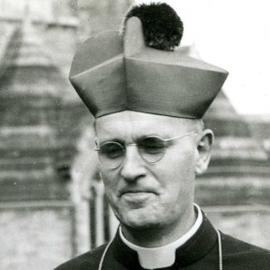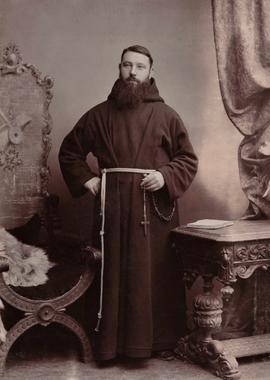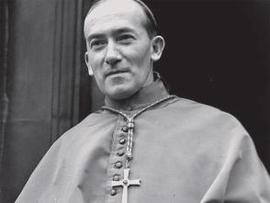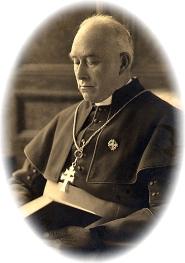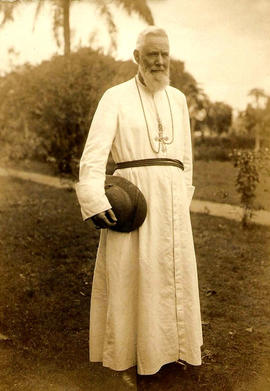- AR 2
- Person
- 21-12-1799
Fr. Ignatius is dead! Our Congregation has lost an excellent subject on earth, but has gained, as we trust, a saint in heaven. It is very difficult to do justice in a short space to the life of such a great servant of God; it would take volumes. Still, something must be said if only to render to the memory of the deceased the tribute of our veneration.
Fr. Ignatius of St. Paul, born the Hon. George Spencer, was the link, so to say, between the death and resurrection of the Catholic Church in England. It was he who threw the first stone that made Protestantism begin to crumble, and it was he who was to be the corner-stone of the Catholic Church which is now rising from its ruins. As a youth he received the sort of education that is usually given to the English aristocracy. He went first to Eton, and from there to Cambridge, where, at the age of 22, he received the Orders which the English call "sacred" and became a minister in the Anglican church. A brilliant career lay before the young minister. Noble birth, influential friends, his own personal gifts and virtues - all pointed to a high position in the Anglican hierarchy.
The Truth, however, which had already begun to enlighten his mind, was to bring to naught all such expectations. With the help of God's grace he began to see the life of a minister and a preacher of the Gospel in a very different light from that of his countrymen. The sacredness of his vocation, he felt, was not compatible with pomp or wealth or the bonds of matrimony. And so he resolved to lead a celibate life and to adopt a life-style which seemed to him more in conformity with the demands of the Gospel, even though at this time he still considered the Catholic Church to be wrong on these very issues.
There were a number of other things, too, which made him feel ill at ease in his present position. To clear his mind once for all of the many doubts that plagued him, he decided to make an earnest study of other religious systems - a study to which he gave himself with a methodical thoroughness all his own. It was all to no avail. But in the end a ray of that "light which enlightens every man" dispelled all doubts from his mind and made him clearly understand that the true Church of Christ was the catholic Church, and that outside her there is no salvation. For a heart as generous and honest as his, that was enough, and he decided to become a Catholic there and then. He was received into the Church in February, 1830. Far from ever regretting the step he had so courageously taken, he never ceased to thank God for the great grace he had received, and it was his constant endeavour to ensure that all his countrymen should share the same favour.
Shortly after becoming a Catholic he went, on the advice of his bishop, to the English College in Rome to study for the priesthood. It was surely by a special dispensation of Divine Providence that he was ordained on 28th May, 1832, the feast of St. Augustine, the Apostle of England, in the church of St. Gregory - the very place where that Pope had commissioned St. Augustine to preach the Gospel in England. He said his first Mass on the feast of St. Bede according to the Benedictine calendar. Fr. Ignatius never tired of telling that story to his brethren, and he had already written to Fr. Dominic about it, full of gratitude to the Lord for such a privilege.
After his ordination he returned to England where he generously gave himself and all he possessed to whatever work was given him to do. For 15 years he was a model priest in the Birmingham diocese, undertaking whatever duty was assigned to him by his Bishop. He built churches, founded missions and generously contributed to the re-establishment of the Catholic Church in that diocese. Because of his outstanding merits, a special "office" was created for him in Oscott College. It had to be abandoned later on for want of anybody capable of following in the footsteps of Fr. Ignatius.
In 1846 he made a retreat at a house of the Jesuit Fathers. After it, to the surprise of everyone, including himself, he discovered he had a vocation to the Passionist Congregation. He wrote immediately to Fr. Dominic, who was then Superior of the Order in England, and he received the holy habit at his hands on 5th June, 1847. He was professed the following year, taking the name Ignatius as a gesture of gratitude to the Author of the Spiritual Exercises, through which, under God, he had received his vocation.
His profession marked the beginning of a new life - not in the sense that his former life, especially since he had became a Catholic, needed any kind of reform, but in the sense that, whereas his work until then had been limited to a comparatively small number of people and places, from now on the whole of England as well as Scotland, Ireland, France, Germany and Italy would become his mission field.
In speaking of the virtues of Fr. Ignatius it is hard to know where to begin. The love of God and zeal for His glory had so taken possession of his heart that he could scarcely think of anything else. The constant subject of his conversation was how to overcome heresy and combat sin. Any other subject left him uninterested, to the point that he would often drop off to sleep in the midst of such conversations. He would gladly have travelled the whole world over to set all men's hearts on fire with the love of God that burned so brightly in his own. His prudence and the obedience which he had vowed put a brake on his zeal, but his fervour, far from growing less, only increased the more because, as he used to say, what one does under obedience is not only more pleasing to God, but more efficacious for saving souls.
Because of the poverty of the Congregation and the special needs of the Province, the Superiors were often obliged to ask Fr. Ignatius to travel to many places all over the country to raise money. Not only did he always undertake such a difficult task with prompt obedience, but he would take advantage of it to give greater scope to his zeal in the way we shall now describe.
We have already said how he had set his mind on bringing back his own people to the Catholic Church. He in no way disapproved of the ordinary means of making converts such as preaching, etc., but he held that the most efficacious way was to pray, and to pray through the intercession of her of whom the Church sings: "Rejoice, O Virgin Mary, for thou alone hast overcome all heresies in the whole world." So it was that Fr. Ignatius took advantage of the travels he undertook under obedience in many countries of Europe to ask of all prayers for the conversion of England. In order to encourage people to pray for this intention, he asked and obtained the blessing of the Pope, who went so far as to grant indulgences to the recitation of three Hail Marys together with the invocation "Our Lady, Help of Christians, pray for us." He took this as the sign of approval of his unique mission. There is no telling how much this devotion spread, and is still spreading, throughout a great part of Europe, or what benefits may be hoped for as a result. It is a fact that from the time when Fr. Ignatius started this devotion, initiated what we may call a campaign of prayer, so many converts have been received in England, so many churches and schools have been built, so many convents and monasteries founded, that it would seem that England is no longer what it was 30 years ago. All this is surely the fruit of the prayers said and the prayers asked for by Fr. Ignatius.
To zeal for the glory of God and the conversion of his country, Fr. Ignatius added a great love of the Regular Observance. So great was his zeal for the Observance that his Superiors often had to moderate it. It often happened that, coming home at night tired and weary after a whole day's work in the confessional or in conducting spiritual exercises, he would have got up for Matins at all costs if his Superiors or his confessor had not forbidden him to do so. Generous as he was himself, he could not understand how a religious, or even a Catholic in the world, could commit even one deliberate fault however small. He used to say that he did not like to hear people say - a thing you hear even from the lips of religious occasionally - "I should be quite happy if I get to Purgatory." His maxim was that we must not be content with mediocrity when it is so easy to reach perfection.
His trust in Divine Providence and his acceptance of God's Will were boundless. Whatever happened to anyone, he wanted it to be seen as a gift from God's hand and as such something to be grateful for. "Thank God for everything" was a phrase that was constantly on his lips. One day he was walking along a dark and lonely road and fell to thinking how easy it would be for an enemy to kill him with just one shot. When asked what he would do in such a case, his answer was: "I should hope to have at least one moment to thank our Lord for the bullet that hit me."
So profound was his humility that he seemed to have forgotten his noble origins altogether and the esteem in which he was held by people of all walks of life. Kind and affable towards everybody, he took special pleasure in dealing with the poor and the ignorant and with little children. He was never heard to complain. For him everything was good. Even the worst prepared food, the oldest and most patched clothing were to him like the finest gifts.
He held successively a number of offices in the Congregation. First he was Master of Novices. Then Fr. Dominic, before he died, appointed him his successor as Superior in England. Then for three years he was Rector of our house in London, after which he was elected Provincial Consultor - an office he held for nine years, i.e. until 1863 when in the chapter held that year he was elected Rector of St. Anne's Retreat, Sutton, near Liverpool.
He had often expressed the wish to die like St. Francis Xavier or like Fr. Dominic, alone and abandoned by all. Through an extraordinary combination of circumstances, or rather by a special dispensation of Divine Providence, his wish was granted. He was preaching in Scotland one of his "Little Missions" - not so "little" judged by the results they produced. These lasted for three days, with two sermons a day and confessions which he heard during all the time that remained between saying Mass and taking his brief rest. (He had already given 245 such missions since 1857 in England, Ireland and Scotland.)
On Friday, 30th September, he had finished one of these missions in a place called Coatbridge, and had been hearing confessions until midnight. At 6 o'clock on the Saturday morning he went back into the confessional until 7.30, when he said Mass. He then got ready to go to Leith where he intended to start another mission that same day. When he got to Carstairs he found the train was not leaving for two hours. Not to waste time, he decided to pay a visit to an old friend of his, named Mr. Monteith, who lived in the vicinity. But it was here that death awaited him. He had a sudden heart attack and dropped dead about 100 yards from his friend's house, without anybody seeing him or being able to help him. His whole life, however, had been one long preparation for death, and so we have every ground for hope that the Lord has already crowned him with the glory that was waiting for him.
Fr. Ignatius of the Child Jesus, the Provincial, received word of the death by telegram. With some of the religious he went at once to the place where the servant of God had died. When the necessary arrangements had been made, the remains were taken on the following Monday to our monastery at Sutton where the Solemn Requiem was celebrated on 6th October. The funeral was attended by a large number of people, clerical and lay, as well as by the community of Sutton and religious from other houses of the Province. The Solemn Requiem was celebrated by the Provincial, and after it the Bishop of Birmingham, Dr. Ullathorne, preached the panegyric to the large and very attentive congregation that had assembled for the occasion. After the Mass, the Bishop together will all the priests present and a large concourse of people accompanied the body to its final resting place. Inside the tomb the following inscription was placed:
"The mortal remains of Father Ignatius of St. Paul, of the Congregation of the Passion and of the noble family of Spencer. He was at first an Anglican minister; then, having been converted to the Catholic Church, was ordained to the priesthood in Rome in the year 1832. With admirable constancy of mind he laboured for more than 30 years for the conversion of his country. He was numbered among the sons of the Passion in the year 1847, and throughout his life gave an example of all the virtues to his brethren. He journeyed throughout England, Ireland and Scotland, and even in Italy, Germany and France, exhorting the people to their own sanctification and forming them, as it were, into a sacred army to pour forth prayers for the conversion of England. He was engaged in this most gratifying work in Scotland when, on 1st. October, 1864, having offered the Sacrifice of the Mass, he was on his way to visit a friend he had long been acquainted with (Mr. Robert Monteith). He died suddenly at his friend's door, being assisted by God whose glory he had ever sought, and by the angels whose purity he had imitated. His life came to an end in the 65th year of his age. May he rest in peace."(translated from the Italian)
[ The Italian version of the above obituary notice was discovered recently in the library of Scala Sancta Retreat, Rome. A photostat copy was sent to us (December, 1976) by Fr. Frederico, Postulator General. Signed: Ignatius C.P. (St. Joseph's Province.)]


